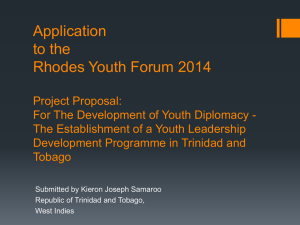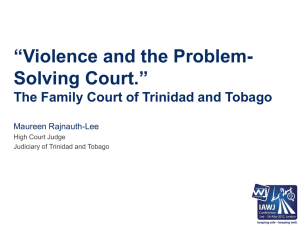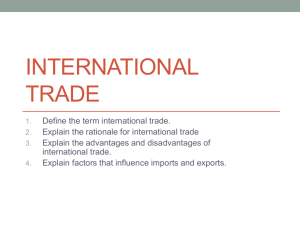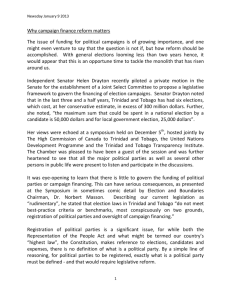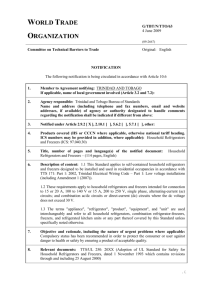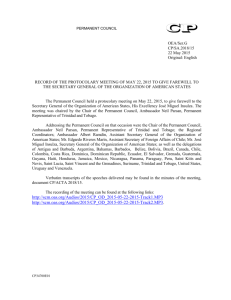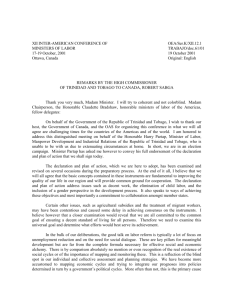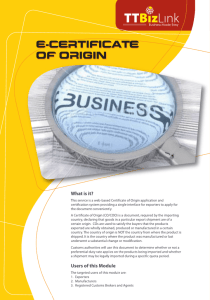Chapter 5: Trade Regulations and Standards
advertisement
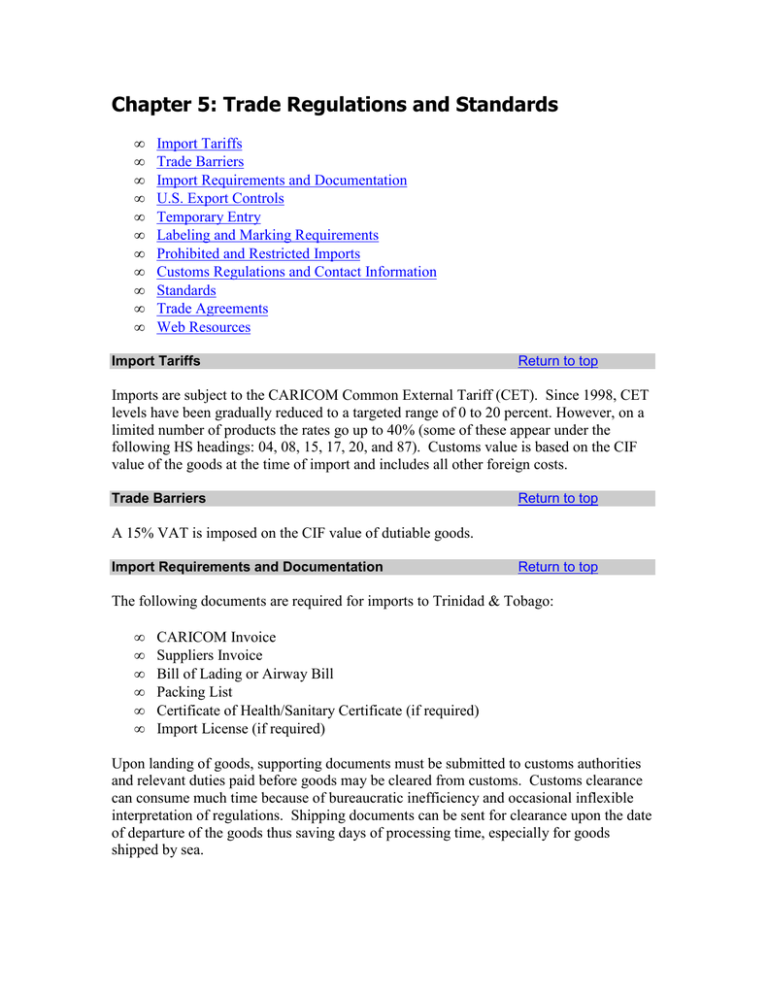
Chapter 5: Trade Regulations and Standards • • • • • • • • • • • Import Tariffs Trade Barriers Import Requirements and Documentation U.S. Export Controls Temporary Entry Labeling and Marking Requirements Prohibited and Restricted Imports Customs Regulations and Contact Information Standards Trade Agreements Web Resources Import Tariffs Return to top Imports are subject to the CARICOM Common External Tariff (CET). Since 1998, CET levels have been gradually reduced to a targeted range of 0 to 20 percent. However, on a limited number of products the rates go up to 40% (some of these appear under the following HS headings: 04, 08, 15, 17, 20, and 87). Customs value is based on the CIF value of the goods at the time of import and includes all other foreign costs. Trade Barriers Return to top A 15% VAT is imposed on the CIF value of dutiable goods. Import Requirements and Documentation Return to top The following documents are required for imports to Trinidad & Tobago: • • • • • • CARICOM Invoice Suppliers Invoice Bill of Lading or Airway Bill Packing List Certificate of Health/Sanitary Certificate (if required) Import License (if required) Upon landing of goods, supporting documents must be submitted to customs authorities and relevant duties paid before goods may be cleared from customs. Customs clearance can consume much time because of bureaucratic inefficiency and occasional inflexible interpretation of regulations. Shipping documents can be sent for clearance upon the date of departure of the goods thus saving days of processing time, especially for goods shipped by sea. Importation of certain items may require an import license issued by the Ministry of Trade and Industry. It is advisable to inquire whether a license is required prior to shipment of goods. U.S. Export Controls Return to top Exporters should consult with the following departments to determine if an export license is required: • Department of Commerce: Items used for military/strategic purposes and commercial applications • Department of State, Office of Defense Trade Controls (DTC): Defense services and defense munitions articles. • Department of Energy: Nuclear technology and technical data for nuclear power, special nuclear materials, and natural gas. Temporary Entry Return to top Temporary entry of goods to be re-exported is allowed with advance arrangement. A deposit or bond covering the duty liability of such items to be imported must be posted with Customs prior to the item’s entry. Items to be re-exported must be clearly identified by a mark such as a serial or part number. Upon re-exportation, the equivalent of ten percent of the duty liability becomes due for every three months the item remained in Trinidad & Tobago. Labeling and Marking Requirements Return to top Labels must be in English and must indicate the country of origin. Labels on garments must indicate size, fiber content and either the name and address of the manufacturer or the registered brand name. In addition, labels on prepackaged goods must include the expiration date, ingredient list, net contents, preservatives, colorings, additives, flavorings, brand or trade name and the name and address or the manufacturer or distributor. Please note that standards, labeling, testing and certification, to the extent that they are required, do not usually hinder U.S. exports. Prohibited and Restricted Imports • • • • • • • Return to top Illegal narcotics* Certain knives, firearms, weapons and explosives* Seditious publications* Left-hand drive motor vehicles imported under section 45(A) of the Customs Act, Chap. 78:01** Used right-hand drive garbage compactors exceeding 15 tons** Paper for wrapping tobacco and cigarette** Ships and boats (under 250 tons)** • • • • • • • • • • • • • • • • • Live Christmas trees* Animals: monkeys and mongoose* Second-hand animal blankets, saddlecloths, felting or pads and dung* Live poultry** Fresh fish (live or dead), chilled or frozen: Shrimp, Lobster, Crabmeat** Ozone Depleting Substances (ODS) (Tariff Heading No. 2903)** Equipment requiring the use of ODS (Tariff Heading No. 8414, 8415)** Coconut in all forms** Oil sead cake, meal and other vegetable oil residues** Copra** Oilseeds, beans, nuts, etc.** Animal oils, fats and greases, unrefined.** Fatty acids and solid residues from the treatment of oils and fats** Vegetable fats** Certain pesticides** Refrigerators, freezers and other refrigerating or freezing equipment, heat pumps and their parts for domestic and commercial use (Tariff Heading No. 84:18)** Portable Fire Extinguishers and their parts (Tariff Headings Nos. 8424.10 and 8424.90)** * Prohibited ** Import license required N.B. Firearms that can be imported require: Import permit, Firearms license from Commissioner of Police Customs Contact Information Return to top Customs Act, Chapter 78:01, First Schedule (Common External Tariff) Effective January 1, 2004. Customs & Excise Division: Tel: (868) 625-3311 (Long Room); Fax: (868) 625-6129. Ministry of Trade and Industry: (868) Tel: 623-2931; Fax: (868) 627-8488 Attn: Chief Trade Officer. Standards • • • • • • • Overview Standards Organizations Conformity Assessment Product Certification Accreditation Publication of Technical Regulations Labeling and Marking Return to top Overview Return to top The Trinidad & Tobago Bureau of Standards (TTBS) is responsible for all trade standards except those pertaining to food, drugs and cosmetics items, which the Chemistry, Food and Drug Division of the Ministry of Health monitors. The TTBS uses the ISO 9000 series of standards and is a member of ISONET. The government is not a party to the WTO Standards Code. Use of either the metric or English system of weights and measures is allowed in Trinidad & Tobago. Products that meet U.S., U.K. or Canadian standards will be accepted by the TTBS. Standards Organizations Return to top The Trinidad & Tobago Bureau of Standards is the National Standards Body of Trinidad & Tobago. It was established in an Act of Parliament (No. 38 of 1972), and now operates under the Standards Act 18 of 1997, which mandates it to be the national standards body, the national quality certifying body, and the national laboratory accrediting body. The TTBS is a full member of the International Organization for Standardization (ISO), the Caribbean Common Market Standards Council (CCMSC), and the Pan American Standards Commission (COPANT). The Bureau is managed by the Standards Council, which is appointed by the Minister of Trade and Industry. An Executive Director, Secretary (Administration), Head of Division, and Manager of Units control the day-to-day activities. The Corporate Policy states: “The Management of the Trinidad & Tobago Bureau of Standards, the National Standards Body, is fully committed to the provision of products and services in the areas of Standardization, Certification, Testing and related activities so as to ensure an acceptable level of satisfaction for all our customers. The provision of these products and services will be undertaken with integrity, professionalism, timeliness, reliability and efficiency, consistent with internationally accepted procedures and levels of quality. In pursuance of this policy, the Management of the Bureau will take all necessary steps to ensure that the Quality Policy and Objectives are understood, implemented and maintained at all levels in the organization. As part of its commitment to this policy, Management will cultivate a working environment that fosters professional development of all staff, as it strives for continuous improvement of the Quality System.” Conformity Assessment Return to top Based on the Standards Act No.18 of 1997, the Trinidad & Tobago Bureau of Standards is the National Laboratory Accrediting organization. The Laboratory Quality Improvement Program (LABQUIP) will accredit the labs. Additionally, the Ministries of the government institute certain regulations. Product Certification Return to top The TTBS uses the ISO 9000 and ISO 14000 certification system. Also, the Trinidad & Tobago Tourism industry has its own set of certification rules. T&T is a part of a mutual recognition agreement with the ISO’s Laboratory Competency Program. Accreditation Return to top The Trinidad & Tobago Bureau of Standards is the only locally accredited body. However, the Bureau does not have jurisdiction over foreign accreditation bodies that visit Trinidad to certify laboratories. The United Kingdom Accreditation Service (UKAS) will accredit technical labs in Trinidad & Tobago and has this right without interference from the TTBS. Publication of Technical Regulations Return to top The technical regulations are a part of compulsory standards. There are 60 classifications for technical regulations, all of which are compulsory for technical regulations. The TTBS informs the WTO of changes in the standards. The National Institute of Science and Technology (NIST), a non-regulatory agency within the U.S. Commerce Department’s Technology Administration, is also informed of recent changes. TTBS is the inquiring point for agencies and organizations that need information about standards and regulations in Trinidad & Tobago. Labeling and Marking Return to top Most standards for labeling and marking are compulsory, while others are voluntary. Depending on the industry, such as toilet tissue, wood technology, and clothing, certain requirements are mandated. Trade Agreements Return to top U.S./Trinidad & Tobago Bilateral Investment Treaty (Signed September 26, 1994; entered into force December 26, 1996) U.S./Trinidad & Tobago Memorandum of Understanding Concerning Protection of Intellectual Property Rights (entered into force 1994) Web Resources Return to top T&T Bureau of Standards: http://www.ttbs.org.tt U.S. Department of Commerce: http://www.bxa.doc.gov/reslinks.htm U.S. Customs and Border Protection: http://www.cbp.gov U.S. Department of Commerce Trade Compliance Center: http://www.tcc.mac.doc.gov
